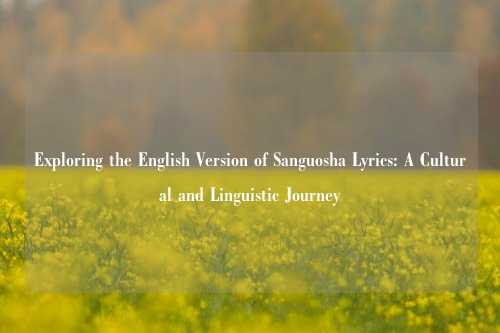The popular Chinese card game Sanguosha (三国杀), inspired by the historical epic Romance of the Three Kingdoms, has captivated players with its strategic gameplay and rich thematic elements. Beyond the mechanics, the game’s theme song—originally in Chinese—has also gained attention. Recently, an English version of the lyrics has emerged, offering a fascinating lens through which to examine cross-cultural adaptation and the challenges of translating culturally specific content.
The Challenge of Translation
Translating Sanguosha's lyrics into English involves more than just converting words—it requires preserving the historical grandeur, poetic rhythm, and emotional weight of the original. The Chinese lyrics are steeped in allusions to legendary figures like Cao Cao, Liu Bei, and Sun Quan, as well as idioms and classical phrasing. The English version must balance accessibility with authenticity, ensuring that non-Chinese-speaking audiences grasp the essence without losing the game’s cultural roots.

For example, lines referencing "烽火连天" (flames of war stretching to the sky) might be rendered as "the blaze of war lights the heavens," maintaining the dramatic imagery while remaining intelligible. Similarly, names of strategies or weapons may need contextual explanations or creative paraphrasing to avoid confusion.
Cultural Nuances and Localization
A successful English adaptation must also navigate cultural differences. Chinese poetry often relies on parallelism and indirect metaphors, whereas English lyrics tend to favor direct emotional expression. The translator must decide whether to prioritize literal accuracy or adapt the phrasing to suit Western musical conventions. Additionally, historical terms like "桃园结义" (the Oath of the Peach Garden) may require brief annotations or rephrasing to convey their significance.
Fan Reception and Artistic Liberty
Fan-made English versions of Sanguosha's theme have sparked discussions about artistic license. Some purists argue for strict fidelity to the original, while others appreciate reinterpretations that capture the spirit rather than the letter. The best translations often blend both approaches, as seen in popular fan renditions that incorporate rhythmic cadence suitable for singing while honoring the source material.
Conclusion
The English version of Sanguosha's lyrics is more than a linguistic exercise—it’s a bridge between cultures. By carefully balancing historical authenticity with modern accessibility, translators can introduce global audiences to the game’s epic narrative and deepen appreciation for China’s Three Kingdoms lore. Whether through official releases or fan creativity, these adaptations highlight the universal appeal of heroism, strategy, and timeless storytelling.
As Sanguosha continues to grow internationally, its music may become a gateway for players to explore the rich history behind the cards—one verse at a time.